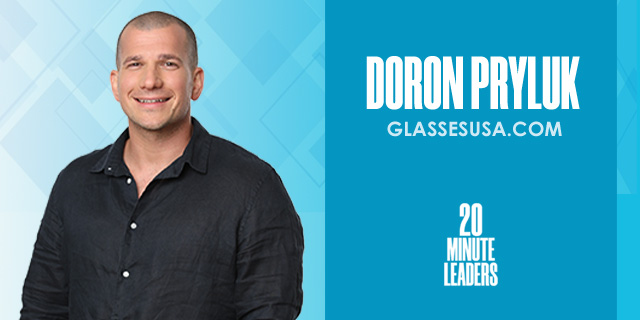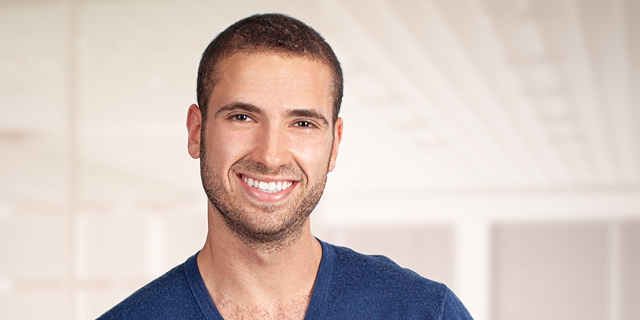
20-Minute Leaders
“I have an innate fear of mediocrity.”
Emotions are an important part of customer experience, says Doron Pryluk, who is VP of customer experience at GlassesUSA.com.
Click Here For More 20MinuteLeaders
You’ve had an incredible journey in some incredible companies. But I have to start off with you as a coach for the Special Olympics. How do you do that?
That takes me back almost 20 years ago. I did it for a year. There's a thing in Israel called the Shnat Sherut, a gap year or community service year. I was already into sports, and I was looking for some volunteering-type of activities. I stumbled upon Special Olympics and coached soccer and basketball. I was exposed to an amazing international organization that until this day does amazing initiatives.
"Customer experience" as a position. What is that?
When I teach my customer experience course at Jolt, the first thing I do is play a two-minute video by Jeff Bezos from 1999. He basically makes the whole spiel about how customer experience is going to make or break Amazon. Fast forward more than two decades later, he had some knowledge or some understanding of the value of customer experience.
Today, there are different elements or schools that comprise the big field of customer experience. It can be support, self-service, knowledge management, or customer success. To me, customer success is an integral part of customer experience.
To put it very simply, customer experience is how your brand makes customers feel. We have KPIs, and there's a lot of data and a lot of measurement. You have to be data-driven. But at the end of the day, it's also something very intangible that you can't really grab a hold of. It's really about a whole holistic set of things that trigger emotions with your end customer or user.
I don't recall from looking at case studies of companies 20 or 30 years ago that customers were so much in the forefront as they are today. How do you explain this transition?
It's really important to remember the way customers feel. I keep going back to feelings because emotions are a very strong part of customer experience. Customers have those emotions before they even use your product, brand, or service. It begins way before that. It begins with word of mouth. It begins with some review they read on Trustpilot. It begins with some posts that they saw on social media.
If you're looking at the way that you're thinking about customers within an organization, how do you prioritize that? How do you go about resolving this as a leader?
I'll start with a disclaimer. I'm not trying to bash any of my amazing product managers and product executive colleagues. But I've seen in a lot of organizations that product leaders, the first thing they do when they talk about go-to-market or developing a new product or feature is a competitor analysis. That is the classic approach. Oftentimes, those leaders forget to do customer interviews and speak to customers and understand exactly what the customer needs, then do some iterations, do some MVPs, and learn from that.
A big part of being a customer experience leader, in any type of company, is it’s a daily struggle. The blanket is always too small. Resources are being pulled from every single direction. There's never enough R&D and budgets and talents to do everything. As a customer experience leader, your goal is to advocate for what our customers need. That needs to be backed with mountains of data and actual information you can then bring as proof for your argument. But it's not easy.
The struggle doesn't end in the product specifications and the PRD and all that analysis. The majority of the experience is just beginning. Right?
Right. Then retention comes into play, churn, how do we get repeat customers, and how do we increase lifetime value. I think there are plenty of examples throughout history of companies that were able to focus on the customer in every single decision, in every single plan, in every single move.
In the planning stage, and then after when there's an MVP or when you've already launched your product, service, or feature, you always have to focus on: What's going on with my customers? Is it working? What's the voice of the customer? Do I listen to the feedback? Do I make iterations based on feedback?
It's very, very difficult. We all have our KPIs and we all have our end of quarter, end of year goals that we need to meet.
What do you get really good at as a leader in customer experience?
At WIX, I've seen customer obsession—when it wasn't even such a big buzzword—really propelling and accelerating the company. This is a company that was customer-centric from day one. I've seen the contribution of that to the success of WIX.
Then in Guesty, I've seen how being customer-centric and focused on customers helped a PropTech company navigate through probably one of the most difficult times for a PropTech company: through the pandemic.
I think companies can really stay focused on the customers at any given moment in their life cycle. Once you lose the connection to your customers, it's probably not a good sign.
If I’m a leader within a startup, how do I know when there's red flags when it comes to my users and customers?
Obviously, there are a lot of other factors that can be involved. But to me, it's finding a good balance between the more hands-on, personal experience and the data-driven approach. Data driven, I think we all understand. You need to be able to have thresholds and alerts and have very clear KPIs.
Then the other side of the coin is the more personal aspect. I always use the Brian Chesky example. He was interviewed on Masters of Scale by Reid Hoffman. He's telling about his first days in the Y Combinator, and he's in San Francisco. Then someone asks him, "Wait, your customers are in New York and you're in San Francisco right now?" This was back in the day when they had a few dozen hosts and they're all in New York City. The next day, he is on a flight to New York, knocking on the doors of the hosts, sitting down with them for coffee and just listening to them.
I think those user interviews are so critical. Sometimes you can have all the data in the world, but if you don't also add that personal dimension and create some sort of mix and balance between those two, you're probably missing a lot of very valuable touch points.
Doron, take me back a little bit. Growing up, what were you fascinated with?
It may sound funny, but I was deeply fascinated by Lego. To this day, I'm an avid Lego collector. I build Lego all the time. What really drew me, and I think what still draws me to Lego, is there's no limits. You have a mountain full of bricks, and you can do whatever you want with them. It excites me to this day. There's no limits. There's endless possibilities.
What are sources of inspiration for you in the world?
I hope it doesn't sound dark. I've come across a lot of inspirational stories, and I post about a lot of inspirational stories that touched me. But if we're talking about inspiration as a source of motivation, I feel like I have an innate fear in me of mediocrity. I know it sounds maybe a bit dark, but to me, this is my biggest motivation.
Michael Matias, Forbes 30 Under 30, is the author of Age is Only an Int: Lessons I Learned as a Young Entrepreneur. He studies Artificial Intelligence at Stanford University, is a Venture Partner at J-Ventures and was an engineer at Hippo Insurance. Matias previously served as an officer in the 8200 unit. 20MinuteLeaders is a tech entrepreneurship interview series featuring one-on-one interviews with fascinating founders, innovators and thought leaders sharing their journeys and experiences.
Contributing editors: Michael Matias, Megan Ryan
